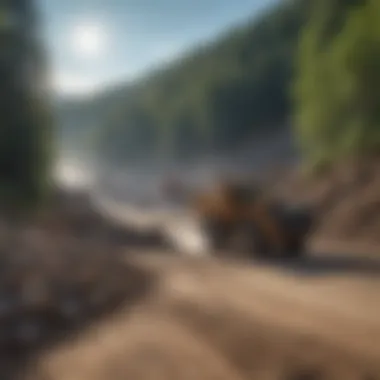Exploring Waste Management Practices at Mountain State Waste in Weston, WV


Evergreen Trees Species
Evergreen trees species play a crucial role in the biodiversity and sustainability of American forests. These trees, such as Douglas fir, spruce, and pine, provide year-round greenery and contribute to the ecosystem's stability and resilience. Exploring the different types of evergreen trees found in the forests of Weston, WV reveals a diverse range of species well-adapted to the region's climate and soil conditions.
The ecological significance of evergreen trees cannot be understated. They offer habitat and food for various wildlife species, support soil health, and aid in water conservation. Evergreens also help mitigate climate change by absorbing carbon dioxide through photosynthesis, thus contributing to carbon sequestration efforts. Conservation practices aimed at protecting and preserving evergreen tree species focus on sustainable forestry management, reforestation efforts, and habitat restoration projects.
Forest Management Techniques
In Weston, WV, forest management techniques are crucial for preserving the rich biodiversity and wildlife habitats present in the region's forests. Strategies revolve around maintaining wildlife habitat preservation through controlled burns, selective logging practices, and protective measures. Sustainable logging practices emphasize responsible timber harvesting methods that ensure the long-term health and productivity of forest ecosystems.
Fire prevention measures are paramount in safeguarding evergreen forests from catastrophic wildfires. Early detection systems and community engagement play a vital role in preventing and mitigating fire incidents, thus protecting both the forests and surrounding communities. Ecosystem restoration initiatives in Weston, WV focus on rejuvenating degraded lands through reforestation, erosion control, and biodiversity enhancement projects.
Climate Change Impact on Evergreen Forests
With climate change posing significant challenges to evergreen forests, understanding its impact is crucial. Evergreen forests play a pivotal role in carbon sequestration, helping to reduce atmospheric carbon levels and combat global warming. Climate change influences weather patterns in forested areas, leading to altered precipitation levels, temperature fluctuations, and ecosystem disturbances.
The effects of climate change on biodiversity within evergreen forests are profound, with shifts in species distributions, habitat loss, and ecosystem disruptions being observed. Localized impacts of climate change on communities and ecosystems highlight the urgent need for adaptive strategies and conservation efforts to ensure the resilience of these vital landscapes.
Management and Preservation of Evergreen Forests
The historical context of American evergreen forests reveals centuries-old practices of sustainable land management and resource utilization by Indigenous communities. Research findings continue to shed light on the biodiversity richness and ecological importance of evergreen forests, informing conservation and management strategies.
Ongoing conservation efforts showcase collaborative initiatives between government agencies, non-profit organizations, and local communities to protect and preserve American evergreen landscapes. Success stories demonstrate the positive outcomes of these collective conservation endeavors, inspiring further action and engagement in sustainable forest management practices.
Outdoor Activities in Evergreen Forests
Exploring the beauty of evergreen forests in Weston, WV offers a myriad of outdoor activities for nature enthusiasts. Hiking trails wind through lush forests, providing serene paths for hikers to immerse themselves in the natural surroundings. Campers can discover pristine camping destinations deep within the evergreen wilderness, offering a tranquil escape amidst the tall trees and fresh air.
Nature photographers find endless opportunities to capture stunning landscapes, flora, and fauna in evergreen forests, showcasing the area's natural beauty through captivating images. Birdwatching enthusiasts are treated to a diverse array of bird species in prime birdwatching areas nestled within the evergreen trees, offering a unique glimpse into the avian biodiversity of the region.
Introduction


In this article, we delve into the intricate world of Mountain State Waste in Weston, WV, uncovering the nuances of waste management practices and their environmental repercussions in the region. Waste management is a critical aspect of maintaining ecological balance and sustainable living. By examining the operations and initiatives of Mountain State Waste, we shed light on the impact of human activities on the local environment.
Overview of Weston, WV
Weston, WV, nestled amidst the scenic beauty of its surroundings, holds a pivotal role in waste management practices within the state. The town's geographical location plays a significant part in shaping its waste management strategies. Understanding the dynamics of Weston, WV provides crucial insights into how waste is generated, handled, and mitigated within the community. Furthermore, exploring the demographic and infrastructural aspects of Weston reveals the challenges and opportunities associated with sustainable waste management.
Mountain State Waste Management
History of Waste Management in Weston
The history of waste management in Weston unfolds a narrative of evolution and adaptation to changing environmental needs. From traditional disposal methods to modern-day sustainability practices, Weston's waste management journey reflects a gradual shift towards enhancing environmental stewardship and resource efficiency.
Landfill Operations
Within the landscape of landfill operations, the types of waste accepted serve as a crucial focal point. By detailing the specifics of waste categories permitted within the disposal sites, this subsection sheds light on the diversity of materials managed and their implications on environmental impact. Exploring the types of waste accepted offers insights into the broader scope of waste management strategies deployed in the region.
Types of Waste Accepted
Discussing the types of waste accepted unveils a nuanced understanding of the materials processed within the landfill sites. By analyzing the key characteristics and the rationale behind accepting specific waste streams, readers can appreciate the strategic decisions made to optimize waste disposal practices. Evaluating the advantages and disadvantages of each waste type provides a comprehensive look into the operational dynamics of waste acceptance.
Technological Innovations
The integration of technological innovations revolutionizes landfill operations, streamlining processes and enhancing efficiency levels. By elucidating the key features and benefits of technological advancements in waste management, this section underscores the progressive approach adopted to mitigate environmental repercussions. Assessing the advantages and potential drawbacks of technological innovations offers a well-rounded perspective on their significance within the waste management framework.
Environmental Impact
The environmental impact stemming from waste management practices necessitates a meticulous examination of monitoring and compliance protocols. By emphasizing the role of monitoring and compliance in upholding environmental standards, this segment underscores the importance of regulatory adherence in mitigating detrimental effects on ecosystems and public health. Exploring the comprehensive monitoring mechanisms provides insights into the proactive measures implemented to safeguard environmental integrity.
Monitoring and Compliance
Scrutinizing the intricate details of monitoring and compliance elucidates the systematic approach towards environmental preservation. By articulating the key characteristics and significance of monitoring procedures, readers gain a deeper appreciation for the meticulous surveillance practices integral to sustainable waste management. Evaluating the advantages and limitations of monitoring and compliance strategies presents a holistic view of their impact on environmental sustainability.


Mitigation Strategies
Mitigation strategies play a pivotal role in counteracting the adverse effects of waste management on the environment. By delineating the proactive measures adopted to mitigate environmental degradation, this section underscores the commitment to sustainable practices and long-term ecological balance. Delving into the unique features and outcomes of mitigation strategies underscores their efficacy in minimizing environmental repercussions and fostering a culture of responsible waste handling.
Sustainability Practices
Waste Reduction Initiatives
Recycling Programs
In the realm of waste reduction initiatives, Recycling Programs stand out as a cornerstone element. These programs enable the recovery and reuse of materials that would otherwise end up in landfills, thereby conserving valuable resources and decreasing the overall volume of waste generated. Recycling Programs are known for their efficiency in promoting a circular economy model, where materials are recycled back into the production chain, reducing the need for raw resources and curbing environmental degradation. One key characteristic of Recycling Programs is their ability to transform waste into secondary raw materials, thus promoting a more sustainable approach to resource management. While Recycling Programs offer substantial benefits in terms of waste diversion and resource conservation, challenges related to contamination and limited market demand may pose certain disadvantages in specific contexts within the waste management landscape.
Composting Efforts
Another vital aspect of Waste Reduction Initiatives is Composting Efforts. By focusing on the organic fraction of waste, composting plays a significant role in diverting biodegradable materials from landfills and facilitating the natural decomposition process. Composting Efforts emphasize the transformation of organic waste into nutrient-rich compost, which can be utilized to enhance soil health and promote sustainable agricultural practices. The key characteristic of Composting Efforts lies in its ability to close the organic waste loop, returning valuable nutrients back to the earth and contributing to the circularity of organic matter within ecosystems. While Composting Efforts offer numerous advantages in terms of soil enrichment and waste minimization, challenges such as odor management and proper site selection may present certain drawbacks in the implementation of large-scale composting initiatives.
Community Engagement
Community Engagement serves as a pivotal component of comprehensive sustainability practices within waste management frameworks. By involving local residents and stakeholders in environmental advocacy and educational campaigns, organizations like Mountain State Waste can foster a culture of environmental stewardship and collective responsibility. Educational Campaigns form a vital part of community engagement by raising awareness about waste management best practices, recycling guidelines, and the importance of sustainable consumption habits. These campaigns aim to empower individuals with the knowledge and tools to make informed choices that contribute to waste reduction and environmental conservation. While Educational Campaigns are highly beneficial in promoting environmental literacy and behavior change, limitations such as varying levels of engagement and outreach efficacy may pose challenges in achieving widespread impact.
Local Partnerships
Collaborating with Local Partnerships is another key strategy for enhancing community engagement and sustainability practices in waste management operations. By establishing collaborations with local businesses, nonprofit organizations, educational institutions, and government agencies, waste management entities can leverage collective expertise and resources to address complex environmental challenges collaboratively. Local Partnerships often bring together diverse perspectives and skills, leading to innovative solutions and outreach opportunities that amplify the impact of sustainability initiatives within communities. The unique feature of Local Partnerships lies in their ability to foster synergies among various stakeholders, driving collective action towards shared environmental goals. While Local Partnerships offer advantages such as shared resources and expertise, potential disadvantages such as coordination challenges and differing priorities require careful consideration to ensure effective collaboration and mutually beneficial outcomes.
Regulatory Framework
Local Waste Management Regulations
In Weston, WV, the Local Waste Management Regulations form the cornerstone of waste disposal practices, dictating the permissible methods, disposal sites, and recycling protocols tailored to the specific needs of the region. These regulations not only outline the acceptable limits for waste emissions and disposal but also set the stage for fostering a culture of environmental responsibility among local stakeholders and waste management entities. As residents navigate the intricate landscape of waste management, a nuanced understanding of these regulations is crucial for ensuring environmental sustainability and adherence to prescribed norms. By exploring the nuances of Weston's Local Waste Management Regulations, readers gain valuable insights into the meticulous frameworks governing waste disposal practices and the overarching objective of preserving the pristine beauty of Weston, WV. The narrative unravels the intricate tapestry of local regulations, illuminating the harmonious coexistence between regulatory oversight and environmental conservation in the landscape of waste management.
Future Prospects


In the realm of waste management, exploring future prospects is imperative to ensure sustainable practices and environmental conservation. Within the context of Mountain State Waste in Weston, WV, identifying and implementing innovations that can propel waste management towards a more eco-conscious direction is paramount. The future prospects section aims to delve into upcoming trends, technologies, and community involvement initiatives that can revolutionize waste management processes in the region.
Innovations in Waste Management
Emerging Technologies
Considering emerging technologies in waste management is crucial for enhancing operational efficiency and reducing environmental impact. Examining specific technologies such as advanced sorting systems, AI-powered waste analytics, and drone-based monitoring can significantly enhance the waste management practices at Mountain State Waste. These technologies offer real-time data insights, streamline waste processing operations, and minimize waste sent to landfills, aligning with the core objective of sustainability in waste management.
On the other hand, it is essential to acknowledge the challenges associated with adopting emerging technologies, such as initial investment costs, maintenance requirements, and potential integration complexities. Despite these hurdles, the benefits of increased efficiency, reduced ecological footprint, and enhanced resource recovery make embracing emerging technologies a compelling choice for Mountain State Waste in Weston, WV.
Circular Economy Models
Implementing circular economy models in waste management presents a paradigm shift towards a more regenerative and sustainable approach. By emphasizing principles of reuse, recycle, and reduce, circular economy models aim to minimize waste generation and maximize resource utilization. Mountain State Waste can explore concepts like extended producer responsibility, product stewardship, and closed-loop systems to create a circular flow of materials that limit environmental degradation and promote long-term sustainability.
While transitioning to circular economy models entails significant systemic changes and collaboration across stakeholders, the advantages far outweigh the challenges. Establishing a closed-loop system can lead to cost savings, reduced environmental pollution, and heightened resilience to resource scarcity, making it a viable and forward-thinking strategy for waste management in Weston, WV.
Community Involvement
In the pursuit of sustainable waste management practices, community involvement plays a pivotal role in fostering awareness, engagement, and accountability. Mountain State Waste can leverage community advocacy and youth outreach programs to instigate meaningful change in waste handling behaviors and environmental attitudes within the local populace.
Citizen Advocacy
Empowering citizens to advocate for responsible waste management practices can amplify the impact of sustainability efforts in Weston, WV. By highlighting the importance of waste reduction, proper disposal, and recycling initiatives, citizen advocacy can influence policy decisions, drive corporate responsibility, and catalyze environmental stewardship among the community members.
While citizen advocacy requires continuous education, outreach, and incentives to maintain momentum, the long-term benefits of an informed and proactive citizenry can lead to a paradigm shift in waste management norms and regulations, creating a more environmentally conscious society.
Youth Outreach Programs
Engaging the youth in waste management initiatives not only cultivates a culture of environmental responsibility but also nurtures future sustainability leaders. Developing youth outreach programs that emphasize waste awareness, conservation activities, and sustainable practices can inspire a new generation of eco-conscious individuals committed to preserving the natural environment.
Despite the challenges of capturing and retaining youthful interest, the advantages of investing in youth outreach programs extend beyond immediate results. Building a knowledgeable and environmentally conscious youth cohort fosters a legacy of sustainability, innovation, and environmental stewardship that can positively shape the future trajectory of waste management in Weston, WV.
Conclusion
In delving into the exploration of Mountain State Waste in Weston, WV, the significance of waste management practices and environmental impact cannot be overstated. Through a thorough examination of landfill operations, sustainability initiatives, and regulatory frameworks, this article sheds light on the critical need for effective waste management systems in preserving our environment and ensuring long-term sustainability. By understanding the historical context of waste management in Weston and analyzing the current environmental impact, readers gain insights into the challenges and opportunities within the industry. Sustainability practices and community engagement emerge as vital components in mitigating adverse environmental effects and fostering a culture of responsibility towards waste disposal. The future prospects highlighted in innovations such as emerging technologies and circular economy models underscore the importance of continuous evolution and adaptation in waste management strategies.
Summary of Key Points
The key points discussed throughout this article resonate with the core theme of environmental conservation and sustainable waste management. From the historical evolution of waste management practices in Weston to the current landfill operations and sustainability initiatives, each aspect contributes to a comprehensive understanding of Mountain State Waste and its impact on the region. The regulatory framework outlines the essential guidelines and compliance measures necessary for effective waste management, emphasizing the role of local regulations in shaping industry practices. Furthermore, exploring sustainability practices like waste reduction initiatives and community engagement showcases the proactive approach towards environmental stewardship adopted by Mountain State Waste. The article emphasizes the necessity of ongoing innovations in waste management, including technological advancements and community involvement, to address the evolving challenges of waste disposal and environmental preservation.



